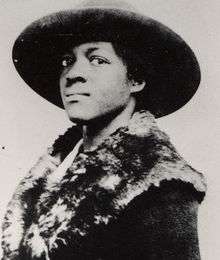Mabel Hampton

Mabel Hampton (May 2, 1902 – October 26, 1989) was an American lesbian activist, a dancer during the Harlem Renaissance, and a philanthropist for both black and lesbian/gay organizations.[1]
Life and career
Early life
Born in Winston-Salem, North Carolina, on May 2, 1902, Hampton was only two months old when her mother died. She was then raised by her grandmother, who died when Hampton was seven years old.
In 1909, the seven-year-old Hampton was put on a train to New York City, where she went to live with her aunt and uncle. Within a year Hampton ran away from that home, having been raped by her uncle and treated poorly by the family.
From ages eight to 17, Hampton lived with a white family in New Jersey; during that time, she was wrongfully imprisoned for prostitution. Eventually, she found work as a dancer in an all-women's dance troupe on Coney Island, New York.
Harlem Renaissance
In the 1920s, Hampton danced in all-black productions for Harlem Renaissance notables, including Jackie "Moms" Mabley. This artistic, political and cultural milieu provided Hampton access to other dancers, artists, and gays and lesbians.
Later career and life
As dance work declined, Hampton left the chorus lines. As quoted by Erin Sexton-Sayler,[2] Hampton explained, "I like to eat." At this point, Hampton began what was to be her longest career: a cleaning woman for white families in New York City. Joan Nestle, the daughter of one of these families, went on to found the Lesbian Herstory Archives in New York City.
Mabel Hampton enjoyed a romantic and sexual relationship with Lillian Foster, whom Hampton met in 1932. The two remained a couple until Foster's death in 1978. Along with her lesbian contemporaries, Hampton volunteered for the New York Defense Recreation Committee (1943); as part of this committee, she collected cigarettes and refreshments for American World War II soldiers.
Legacy
With only her working-class income, Hampton managed to attend performances of the Negro Opera Company, as well as to contribute to the Martin Luther King Memorial Fund and, later, to gay and lesbian organizations.
In addition to her financial contributions to gay and lesbian organizations, Hampton marched in the first National Gay and Lesbian March on Washington, and she appeared in the films Silent Pioneers and Before Stonewall. In 1984, Hampton spoke before thousands of onlookers at New York City Lesbian and Gay Pride Parade in 1984; there, she said, "I, Mabel Hampton, have been a lesbian all my life, for 82 years, and I am proud of myself and my people. I would like all my people to be free in this country and all over the world, my gay people and my black people."
Moreover, she has left a legacy of invaluable archival materials to the Lesbian Herstory Archives. Throughout her career and adult life in New York, Hampton collected memorabilia, ephemera, letters, and other records documenting her history, providing a window into the lives of black women and lesbians during the Harlem Renaissance.
References
|